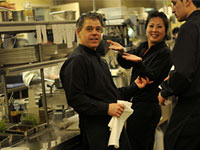Staying Fit
Half a salary is better than none. And these days, it takes 50-year-old Phil Bookfor three part-time jobs just to earn that.


After 17 years at the Tropicana Casino and Resort in Atlantic City, N.J., where he worked as a supervisor making $48,000 a year, Bookfor got laid off in 2007. He's been unable to land a full-time job since. So he works as a waiter at two restaurants and as a concierge at a convention center — sometimes all in the same week.


AARP Membership— $12 for your first year when you sign up for Automatic Renewal
Get instant access to members-only products and hundreds of discounts, a free second membership, and a subscription to AARP the Magazine.
See also: Unemployed face bias.
"It's hard to juggle three jobs," says Bookfor, who credits his gym routine with keeping him fit, energetic and upbeat. "One calls you to come in, another calls you on the same day and you can't go, so they think they can't depend on you. It's tough."
Welcome to the new post-recession labor landscape. Since December 2007, U.S. employers have shed 8.7 million jobs, and as of April had added back only about 1.8 million. Consequently, older and younger workers alike are increasingly forced to accept part-time or temporary jobs in lieu of full-time work, or take full-time positions inappropriate to their skill level and previous pay grade.
To make ends meet, laid-off managers now work as cashiers. Unemployed teachers are delivering pizzas. Engineers are fixing computers. These are the underemployed, and according to the Bureau of Labor Statistics (BLS), their growth as a group is unprecedented.
Blame a weak labor market. Even though jobs creation has gained momentum recently, the economic recovery has been painfully slow. "Many of the jobs people had before the recession may have disappeared, so they've been forced to take something that may not utilize their skills or abilities," says Sara Rix, senior strategic policy adviser at AARP. "Also, it's often easier for people to find employment if they have a job."
Many economists say the underemployment rate is a truer gauge of the nation's job situation than the unemployment rate alone. While unemployment has dropped to 9 percent, the underemployment rate has hardly budged, and remains at 19 percent, according to the Gallup polling and research firm.

































































More From AARP